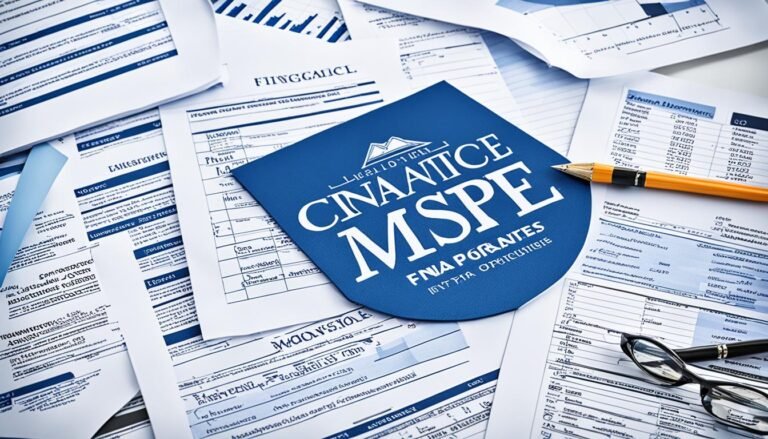Best Master of Science in Financial Economics (MSFEc) Programs
Do you know how much money the global finance industry might make by 2022? It’s expected to reach a massive $26 trillion. With the financial world always changing, experts in financial economics are becoming more and more important. Getting a Master of Science in Financial Economics (MSFEc) gives you the skills and knowledge for a successful career in banking, finance, or at corporations.
This guide will take you through everything about MSFEc programs. We’ll cover what they offer, the job possibilities, getting in, getting help with money, and much more. It doesn’t matter if you’ve just finished school or you’ve been working a while. Knowing about the top MSFEc programs can help lead you to a great future in finance or economics.
Key Takeaways:
- Global finance industry revenue is projected to reach $26 trillion by 2022.
- MSFEc programs provide knowledge and skills necessary for success in finance and economics.
- Career opportunities for MSFEc graduates include research positions and roles in banks and corporations.
- Admission requirements vary but typically include an undergraduate degree in a related field.
- Financial aid and scholarships are available to support the cost of MSFEc programs.
Key Features of MSFEc Programs
MSFEc programs give students skills and knowledge needed for the job market. They are taught in leading schools worldwide, including top ones in the USA.
Rigorous Training in Finance
In MSFEc programs, students learn about finance in-depth. They cover financial decision-making and risk management. It helps them understand complex financial worlds and make smart choices.
Opportunities for Research and Internships
Students in MSFEc programs can do research or intern. This lets them use what they learned in real scenarios. It prepares them for various roles in finance with hands-on experience.
Prestigious Institutions and Faculty
These programs are known worldwide. Grads learn from top faculty, experts in their fields. Getting taught and mentored by such professors improves the learning process.
Global Perspective
MSFEc programs draw students from everywhere, making the classroom global. This mix benefits all, sharing financial insights from different parts of the world. It leads to worldwide opportunities, including study abroad and dual degrees.
Career Opportunities for MSFEc Graduates
Graduates of MSFEc programs find many career paths in finance and economics. They learn about economic theories and financial models. This helps them get jobs in many places, from banks to academia.
MSFEc programs give graduates a deep understanding of financial economics. They can focus on what they’re most interested in. Knowing which programs are highly ranked can guide students to the best education for their future.
After the program, graduates can choose from various jobs like:
- Financial Analyst: They look at financial information to help make investment choices.
- Risk Manager: They spot and handle risks in financial settings.
- Research Economist: They study economic info to expand our understanding.
- Investment Banker: They help with big financial deals and raising money.
- Consultant: They give expert advice on finance and economy to clients.
These jobs show the many ways MSFEc graduates can make an impact. They have the knowledge to stand out in the job market. This opens doors to rewarding careers in finance and economics.
“The advanced financial economics degrees from top-ranked MSFEc schools lead to diverse and fulfilling jobs in finance and economics.”
Specialization in Advanced Financial Economics
MSFEc programs offer the chance for graduates to pick a specialization. They can choose areas like risk management, quantitative finance, or behavioral economics. This makes them experts in their field.
Specializations let graduates delve deeper into complex financial ideas. They gain valuable skills that are in high demand. This can lead them to advanced roles and leadership opportunities.
Specializing in advanced financial economics is beneficial for those wanting to teach, work in large companies, or start their own business. It gives graduates a competitive edge and new career paths.
Benefits of Pursuing an MSFEc Degree
Getting an MSFEc degree has many pluses. It teaches you about economic systems and financial ideas, which are key in finance jobs. With this knowledge, you become a sharp analyst and have great math skills. Employers want people with these abilities.
MSFEc grads make strong connections with others in their field. This network helps a lot in finding jobs. So, by getting an MSFEc degree, you boost your chances in the finance and economics world.
Admission Requirements for MSFEc Programs
Each MSFEc program’s admission requirements differ by the university and program. Yet, there are common conditions most applicants must meet to be considered.
Undergraduate Degree in a Related Field
Applicants are often asked to hold a bachelor’s degree in fields like economics, finance, or math. This background ensures they understand core finance and economics principles.
Standardized Test Scores
Applicants usually need to submit GRE or GMAT scores. These tests show if they’re ready for advanced study and help schools judge their academic skills.
Strong Academic Performance
Having done well in undergraduate classes is crucial. Good grades in relevant courses prove a candidate can handle the demands of an MSFEc program.
Letters of Recommendation
Letters from teachers/supervisors who can vouch for academic skills and work ethic are a must. They offer a deeper look into an applicant’s qualities.
Research the Specific Requirements
It’s vital for prospective students to look into what each top university or program needs. Knowing and fulfilling all criteria improves their application’s success rate.
Comparison of Admission Requirements for MSFEc Programs
| University | Undergraduate Degree | Standardized Test Scores | Academic Performance | Letters of Recommendation |
|---|---|---|---|---|
| University A | Economics, Finance, or Mathematics | GRE or GMAT | Strong academic performance | Required |
| University B | Economics or Related Field | GRE | Above Average GPA | Required (2-3) |
| University C | Finance or Business | GMAT | High academic performance | Required (2) |
Prospective students should closely study the requirements of their target schools. Adhering to these guidelines and presenting a standout application lifts their chances of gaining admission to prime MSFEc programs.
Financial Aid and Scholarships for MSFEc Programs
Financing a graduate degree worries many students. But, scholarships and financial aid options are out there for MSFEc programs. Universities often give scholarships or jobs that help pay for tuition. These can also offer money for living costs. Also, groups outside of schools sometimes give financial help to students studying finance or economics. So, it’s smart for students to look hard at what help might be available. They can apply for scholarships to cut down the cost of school.
Financial Aid Options
There are lots of ways to get help with paying for an MSFEc degree. Many types of financial aid aim to lighten the load of tuition and living expenses. For instance, students can find help through:
- Scholarships from the school
- Jobs at the university and research roles
- Grants and fellowships
- Government financial aid
Applying for Scholarships
Getting a scholarship can lower the costs of an MSFEc degree. Here’s some advice for students looking for scholarships:
- Look for scholarships just for finance and economics master’s degrees.
- Make sure you qualify and know when to apply.
- Get your application together, including a strong personal statement and letters of recommendation.
- Send in all the needed paperwork on time.
- Stay in touch with the people giving out the scholarship to make sure they got your application.
Starting to apply for scholarships early is key. It gives you time to find the right ones and put together a great application.
Many universities offer scholarships or assistantships to deserving students, which can cover tuition fees and provide a stipend for living expenses.
Also, outside groups might have scholarships just for finance and economics students. These can offer more financial support for those studying for an MSFEc degree.
| Scholarship Name | Eligibility Criteria | Estimated Award Amount |
|---|---|---|
| ABC Scholarship | Open to all MSFEc program applicants, based on academic merit | $10,000 per year |
| XYZ Fellowship | Available to students with exceptional research potential | $15,000 per year |
| DEF Grant | Financial need-based grant for students from underrepresented backgrounds | $5,000 per year |
International Opportunities for MSFEc Students
MSFEc programs give students from all over the globe the chance for exciting international experiences. They can learn about finance and economics from a worldwide viewpoint. By joining the best Master of Science in Financial Economics (MSFEc) programs, students dive into a variety of global ideas and strategies.
Top finance and economics schools team up with international institutions. This helps create programs where MSFEc students can study abroad. These experiences help them better understand finance around the world.
Joining exchange programs lets students work with teachers and peers from different countries. This leads to shared learning and a wider professional network. They get to see finance and economics up close in various places. This knowledge is key to working in the global financial sector.
Dual-degree programs are another option for MSFEc students. They can earn two degrees from separate schools. This not only boosts their academic profile but also helps them become more globally aware.
Studying abroad gives you a wider set of skills and an international perspective that is highly valued in today’s interconnected world.
These chances are thanks to the strong reputation of the top finance and economics universities with MSFEc programs. These schools work with top global institutions. This shapes an environment that supports international cooperation and understanding.
For MSFEc students, global experiences are priceless. They build a global mindset and move towards an international career in finance or economics. This makes them stand out in the job market. They become top picks for roles in global companies and finance organizations.
In the end, these international programs greatly benefit students. They boost both academic and professional growth on an international level. This kind of experience enhances their personal and professional skills. It prepares them well for the challenges of the worldwide finance and economics field.
Research and Publications in MSFEc Programs
Research and publications are key in MSFEc programs. They stress academic exploration, advancing knowledge in financial economics. Students often need to finish a thesis or research project for their degree.
This work lets students study deeper in financial economics. It helps them become experts and add to the field’s knowledge. Research lets MSFEc students find new methods, look at data, and share new ideas. These can change the industry for the better.
Top MSFEc schools have lively research scenes. They draw in big-name researchers and publish in top journals. Doing research boosts students’ academic profiles. It also opens doors for more research work or PhD studies.
“Research is the foundation of progress in financial economics. Through our MSFEc program, we encourage students to explore new frontiers, generate insights, and contribute to the academic community.”
– Dr. Elizabeth Thompson, Professor of Finance, Fairview University
Advancing Financial Economics through Research
Financial economics research covers many topics like risk management and financial markets. MSFEc programs support students with tools and advice for in-depth studies.
Students gain experience in analyzing data and modeling. They learn to solve real financial problems. This combines what they learn in theory with real life.
Collaborative Research Opportunities
MSFEc programs build a culture of research teamwork. They team up with professors and peers for projects. This lets students tap into different fields of knowledge.
Table: Collaboration Opportunities in MSFEc Programs
| Opportunity | Description |
|---|---|
| Research Assistantships | Students can work as research assistants, helping professors with their research |
| Research Workshops | Workshops allow students to share their research and get feedback |
| Faculty Mentoring | Professors guide and support students during the research process |
| Joint Research Projects | Students partner with industry members for practical research experience |
Collaborative research in MSFEc programs improves research skills and builds connections. It helps students grow their network in financial economics.
Research and writing are vital in MSFEc programs. They let students share knowledge, work with experts, and improve their academic standing. These programs help students become leaders in financial economics.
Alumni Success Stories from MSFEc Programs
Alumni from the Best Master of Science in Financial Economics (MSFEc) Programs have reached impressive heights in their careers. They lead in banks, financial firms, and major businesses worldwide. Their success stories encourage current and future MSFEc students, showcasing the wide range of career options and accomplishments these programs offer.
Maria Rodriguez, a former student, shares how her MSFEc experience shaped her career. “Thanks to my MSFEc knowledge and skills, I’m now in a top role at an investment bank. I use the analytical methods and financial theories learned in my program every day.”
James Lee also found the MSFEc program pivotal for his career. “It gave me a strong start in financial economics,” he states. “Now, I’m recognized for my research, which has deepened our economic and financial knowledge through impactful papers.”
These stories show the excellence and reputation of the top financial economics programs. Graduates can build successful finance careers, lead in research, and become notable figures in academia.
| Name | Position | Organization |
|---|---|---|
| Lisa Chen | Managing Director | Global Investment Bank |
| Michael Johnson | Chief Economist | International Monetary Fund (IMF) |
| Amy Thompson | Associate Professor | Top-Ranked University |
| David Kim | Quantitative Analyst | Hedge Fund |
The roles held by MSFEc alumni show the program’s flexibility and its ability to ready graduates for various professional worlds. From leading financial institutions to top academic positions, these alumni highlight the meaningful contributions of MSFEc graduates in the finance and economics domain.
Networking and Professional Development in MSFEc Programs
MSFEc programs are key for networking and improving professional skills. They let students grow their skills, meet new people, and learn from finance and economics experts.
MSFEc programs have events where students can meet alumni, teachers, and industry pros. This is a great chance to talk, share ideas, and make contacts for future opportunities.
Students also get to hear from industry experts in special lectures. These talks share what’s new and important in finance and economics. They help students understand how what they’re learning connects to the real world.
Workshops are another big part of MSFEc programs. They teach things like data analysis and how to make financial models. It gives students skills employers really look for in finance jobs.
The alumni networks of top MSFEc schools are like gold for students. Alumni can be mentors, giving advice and help to find jobs. They might even offer chances for internships or jobs.
Being active in networking and career development is great for an MSFEc student. It can lead to good internships, jobs, and promotions in finance and economics. Building a strong network and skill set is key.
If you’re thinking about getting an MSFEc, check out the networking and career building options each program offers. Picking the right school is important for your future success.
Conclusion
The area of financial economics provides many chances for those wanting to grow their careers. Getting a Master of Science in Financial Economics (MSFEc) from a top school builds a strong base. This opens paths to roles in research, banking, finance companies, and corporations.
These programs also let you study abroad, offer help with finances, and boost your professional network. You can learn about finance and economics from a global standpoint. With the right education and abilities, you can do well in the fast-paced, competitive field, making a real difference.
Choosing a respected MSFEc program helps students learn advanced analysis and math. These programs also help you connect with others in the field. Thanks to these ties, students can meet professionals and get advice. This prepares MSFEc grads for the job market and lets them contribute through their own research and work.
From digging deep into economics to managing money or creating financial strategies, financial economics has a lot of career options. To stand out in this field, a top-ranked MSFEc program is key. It gives you the tools and understanding needed to succeed in finance and economics.








